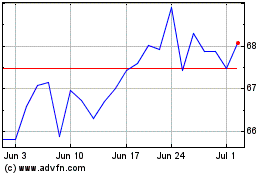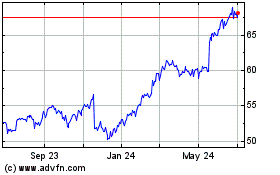Indian Minister Says Global Retailers Want to Invest After Food Store Rules Relaxed
September 21 2016 - 8:50AM
Dow Jones News
NEW DELHI—Global retail giants who have been reluctant to dive
into the Indian market due to restrictions on how they supply their
stores are ready to ramp up their presence in the South Asian
nation through outlets that sell only locally-sourced food, said
the country's food-processing minister.
Wal-Mart Stores Inc., Tesco PLC and others think food-only
retail outlets will have a better chance of being able to fulfill
requirements that they fill their shelves with locally made
products.
The companies see the huge potential of the world's second most
populous country. They have dabbled in selling products wholesale
and are ready to enter the retail market through outlets that sell
just local fresh produce and processed food, said Food Processing
Minister Harsimrat Kaur Badal.
"Retailers want to come to India as our markets and
opportunities are too good," she said in an interview.
In 2012, Wal-Mart shelved plans to build consumer-facing retail
stores, saying the rules to do so were too tough. It now runs 21
wholesale stores in India that don't directly sell to consumers.
Tesco has been working on opening multibrand retail stores which
sells food and nonfood products with an Indian partner.
A spokesman for Wal-Mart in India said the retailer was
currently "evaluating" the government's food-processing policy. In
February, when India first announced it would loosen rules in the
food-processing sector to attract more foreign investment, Krish
Iyer, president for Wal-Mart in India, called it a "very
progressive" step.
Trent Hypermarket Pvt. Ltd., a joint venture between Tesco and
India's Trent Ltd., didn't immediately respond to request for
comment.
Ms. Kaur recently met with retailer and food processor
executives in the U.K., including those from Tesco, J. Sainsbury
PLC and Marks and Spencer PLC. Many said they were exploring
tie-ups with Indian companies to allow them to navigate complex
local regulations to open stores and set up food-processing
facilities, she said.
With millions of tiny mom-and-pop shops lobbying for protection
from global brands, India has been reluctant to open much of its
retail market to foreign firms. Such companies were blocked from
owning retail outlets that sell more than one brand but they were
allowed wholesale outlets and stores that sell only one brand, like
IKEA for example. New Delhi eventually opened the retail market to
some foreign ownership of multibrand retail outlets as well but set
a tough requirement that foreign-owned multibrand retail outlets
get at least 30% of their products from small and medium sized
companies in India.
The latest incremental opening of the sector was implemented in
June, permitting foreign companies to have 100% stakes in food
retailing ventures in India, with the caveat that goods should be
either grown or processed domestically. Foreign retailers can't
sell imported food products or any other merchandise in such
stores.
Ms. Badal is hoping this new opening will convince international
firms to invest in India's overburdened and outdated food
processing and logistics networks. If the food retailers and
processors did more in India they would also start exporting more
from India, she said.
Global retailers want the government to review its
local-sourcing policy and permit at least some limited sales of
nonfood items such as household goods in these new stores, Ms.
Badal said.
She said she would be "taking up the matter with the Prime
Minister and the Commerce Ministry very soon."
Preetika Rana contributed to this article.
Write to Rajesh Roy at rajesh.roy@wsj.com
(END) Dow Jones Newswires
September 21, 2016 08:35 ET (12:35 GMT)
Copyright (c) 2016 Dow Jones & Company, Inc.
Walmart (NYSE:WMT)
Historical Stock Chart
From Mar 2024 to Apr 2024

Walmart (NYSE:WMT)
Historical Stock Chart
From Apr 2023 to Apr 2024
